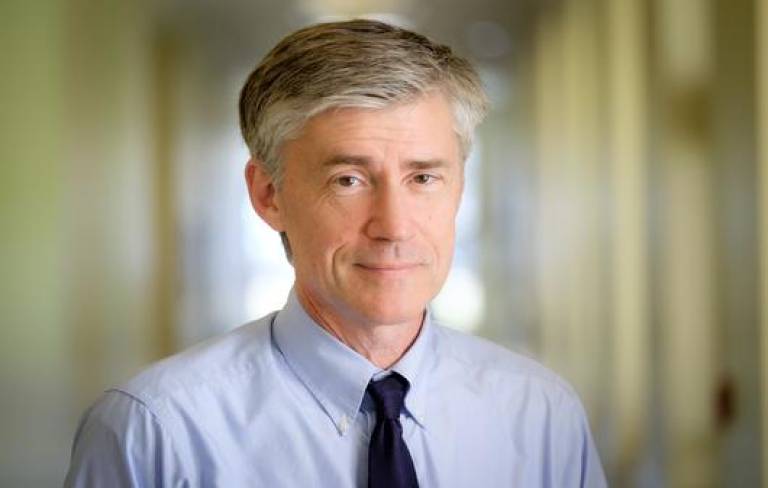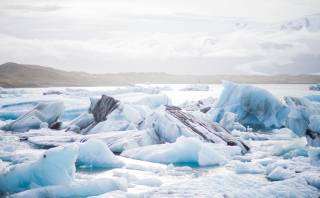The UN Special Rapporteur's Perspective on Agenda-Setting in Climate Change and Human Rights
16 February 2017
An interview with John Knox, the first Independent Expert on human rights and the environment appointed by the Human Rights Council.

Over the period from 2008 to 2015, who would you say were the handful of key policy entrepreneurs who critical to bringing climate change and human rights (CCHR) onto the decision agenda at UNFCCC. What were the watershed moments in your view?
There are two key levels of entrepreneurship - one is to link climate change and human rights together at all, and one is to get the issue on the UN agenda, notably at the Human Rights Council and UNFCCC and eventually the Paris agreement. The reason I make this distinction is because the actors are different. To establish the link, the first important step was the Inuit Petition before the Inter-American Commission on Human Rights in 2005. Here, the important entrepreneurs were the Inuit themselves, as well as the Centre for International Environmental Law (CIEL) and Earth Justice.
CIEL then supported the Maldives before, during, and after the Male' Declaration on the Human Dimension of Global Climate Change, which set out a clear roadmap that was then followed over the next couple of years. The Male' Declaration put forward a pragmatic and clever strategy to activate the UN human rights apparatus to influence climate negotiations. And of course this is what happened. The OHCHR published its report on the issue, which became the basis for further work within the UN human rights system. The report made it easier for special rapporteurs, giving them a common reference point and a green light to look at climate change within the context of their own work. This created a precedent that the UN Human Rights Council could and should indeed look at climate change.
The reference to CCHR in the Cancun agreement, facilitated by the Mexican COP Chair (who had a human rights background) proved another crucial early achievement. In fact, it was amazing to secure a reference to CCHR already at that stage. But this meant that the text got ahead of the politics on the issue. Many people would probably say that the Cancun language was wonderful but did not result in many concrete changes, which then resulted in a loss of momentum after Cancun.
The next big development was in the UN Human Rights Council, key CCHR entrepreneurs among the states, including again the Maldives, as well as Costa Rica and Switzerland, decided that rather than pushing for a special procedure on human rights and climate change, they would push for a special procedure on human rights and the environment. This placated concerns on the part of some countries that felt that the CCHR agenda was progressing too rapidly and that the norms were not well developed yet, so that it was premature to have a special procedure on CCHR.
Do you think the argument to actually link climate change and human rights was eventually won and how long did this take?
The discussions in the Human Rights Council were very telling and I saw the change over time myself. Countries moved quite rapidly from asking basic questions on whether climate change and human rights should be linked at all, to agreeing that climate change definitely had adverse consequences for human rights. This happened very quickly and everyone who worked on CCHR, going all the way back to the Inuit petition and including academics, NGOs and governments, helped to shift the terms of the discussion. But of course, this would not have happened if the argument was not true. In other words, this was a pretty easy argument to make once people started to connect the dots.
The key question, once the link between climate change and human rights was established, was what should be done about it? What duties are there on the part of states? These of course are harder questions and I am not sure there is total consensus on them yet. The UN Human Rights Council started to consciously argue quite early on that their discussion needed to be transmitted to the UNFCCC. The Special Rapporteurs supported this point and advocated for incorporation of human rights concerns into climate negotiations early on, including at Copenhagen and Cancun.
After my appointment, my position provided a focal point for discussions on CCHR. I was able to, among other things, convene a consultation in Charmonix in 2014, bringing together civil society and academics from both climate change and human rights in order to bridge the silos of the "Bonn group" and the "Geneva group." The respective groups knew about each other's work, but really had not worked together previously. So my consultation, and others like it, helped to facilitate the consolidation of the discussion on CCHR.
Another important factor throughout was the involvement of Mary Robinson and her foundation. She was able to leverage her extensive contacts and convening power in order to bring people together and put CCHR on the agenda of key influencers - in this process no one else really had this ability to bring up CCHR, for example, in meetings with Foreign Ministers. In February 2015, she helped convene the meeting that led to the Geneva Pledge for Human Rights in Climate Action, which was crucial ahead of the Paris negotiations.
That spring, I also spoke to a number of people, including Marc Limon (note from the editor: also see the separate GGI interview with Marc Limon on CCHR published in conjunction) in relation to support of the Climate Vulnerable Forum (CVF). It became clear that it would be helpful for a number of special rapporteurs to write a report focused on the effects of even a 2 degree temperature increase on human rights. The CVF asked us to prepare such a report, which I led and some of my colleagues joined. The report we presented to the CVF essentially drew on the evidence of the IPCC report and pointed out that even under a 2 degree temperature rise there would be a significant adverse impact on human rights. And this was important because it turned out that this report gave ammunition to the CVF for their subsequent arguments in the run-up to Paris, that the 2 degree target was really insufficient and needed to be dropped to 1.5. This certainly contributed to the final language that came out of the Paris agreement.
How important do you think was this special rapporteur report for the CVF's advocacy for an ambitious climate deal going into Paris?
The report highlights the human rights concerns and provides a description of the scale of the impact, clarifying what is at stake. And this important point of the human rights perspective really runs throughout the entire process from the very beginning. In the words of the Maldives' Foreign Minister, the point of the human rights perspective is to put a human face on climate change. The CVF could have made similar arguments without human rights references, but the human rights language really supported their efforts to highlight the human effects of climate change.
In terms of advocacy at the UNFCCC, would you say that the key policy entrepreneurs saw human rights more as a means to an end of securing a more ambitious climate deal, or as an end in itself?
The key policy entrepreneurs had multiple goals. Civil society was indeed focused on securing human rights language and this was later also supported by states, and again Mary Robinson played an important role in facilitating this. But another goal was to use human rights rhetoric as leverage. And the fruits of these two goals are of course ultimately reflected in these two aspects of the Paris agreement.
Following conversations between Mary Robinson and the special rapporteurs back in 2014, we first suggested this idea of a specific reference to human rights in the Paris agreement, building on Cancun. Civil Society Organisations then did a huge amount of important work to push governments to think about the issue and consider including this language. And some governments notably took this on board. But, as I understand it, the human rights language really did not take off until the Fall of 2015, shortly before the final stages of the negotiations in Paris.
Do you continue to be optimistic on the implementation of CCHR after Marrakech?
From my perspective, CCHR has two dimensions. The macro perspective focuses on climate justice and fairness at the international level, as discussed in my March 2016 report to the Human Rights Council on the duties of states and how Paris implements those duties. The micro level focuses on specific projects and the implementation of specific initiatives. For example, in the construction of a new renewable energy plant, the involved parties need to make sure human rights are not violated.
At the macro level living up to the human rights commitments of the Paris agreement depends on states and whether they will meet their commitments and continue to strengthen them. Are the major emitters taking a lead? At the micro level, implementation depends on a case-by-case assessment. A key indicator is whether safeguard mechanisms, including related to climate finance, reflect minimum human rights standards.
How seriously do you take Chinese ambitions for climate leadership, notably in the context of President Xi's speech at the World Economic Forum? What are the implications from a CCHR perspective?
At the macro level, complying with the human rights commitments of the Paris Agreement first of all means reducing emissions. So China's commitments in this regard are good news and consistent with China's human rights obligations regardless of whether its initiatives are framed in human rights terms. The substance of their action will be crucial. We have already seen China making commitments beyond its Paris Nationally Determined Contribution, and this is heartening. But ultimately, the proof is in the pudding. And, of course, this is quite separate from the micro-level implementation of specific projects and their respect for human rights.
This interview was conducted by Matthias Mueller in January 2017. It is referenced as 'Knox interview' in "Climate Change and Human Rights: Agenda-Setting Against the Odds" (UCL Global Governance Institute Working Paper Series, 2017/1).
John Knox is the Henry C. Lauerman Professor of International Law, Wake Forest University, and an internationally recognised expert on human rights law and international environmental law. In July 2012, the United Nations Human Rights Council appointed him to a three-year mandate as its first Independent Expert on the issue of human rights obligations relating to the enjoyment of a safe, clean, healthy and sustainable environment, and in March 2015, his mandate was extended for three years and his title changed to Special Rapporteur.
From 2008 to 2012, he provided pro bono assistance to the Government of the Maldives and the Center for International Environmental Law in their efforts to bring human rights law to bear on climate change and other environmental problems (see his website for further details).
 Close
Close


